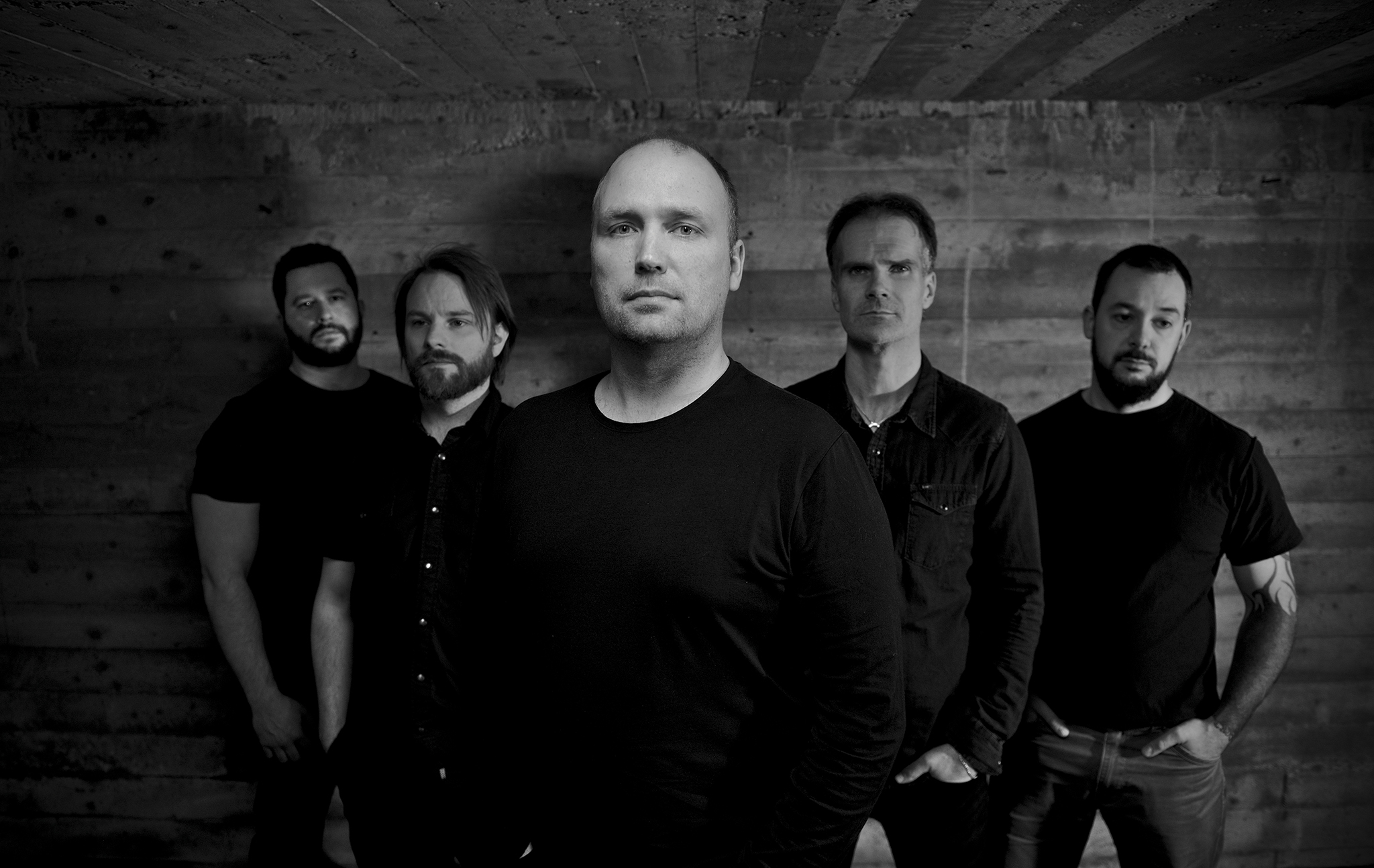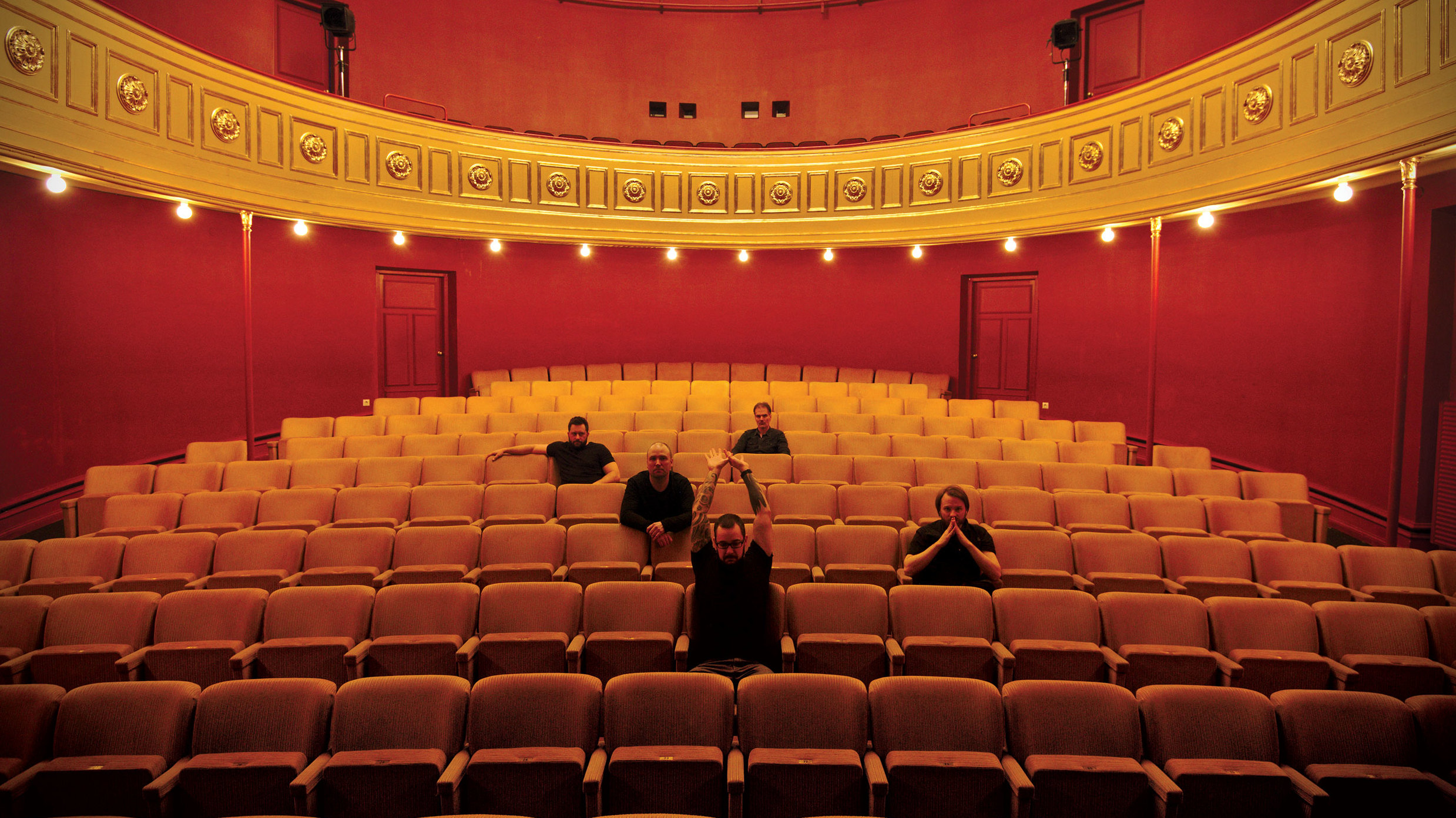They say a week is a long time in politics. In that case, five years is an absolute eternity, even in the slightly less fractious world of progressive rock. In fact, so much has happened during the last five years that even keen observers could be forgiven for thinking that Sweden’s Wolverine had disappeared altogether. But like all the greatest bands in the modern scene, these two-decade veterans have simply been planning their next move, away from the spotlight and firmly entrenched in the familiar minutiae of everyday life. As bassist Thomas Jansson explains, the road to new album Machina Viva has been a long but relatively straightforward one.
“We always go slow anyway, so I guess it’s been business as usual,” he laughs. “I don’t have a sensible answer for what’s happened in the last five years, to be honest. The clichéd answer is that it’s just life that gets in the way, but it’s true. I started teaching one year before our last album [2011’s Communication Lost] was released, and the profession consumed me to some extent.
“Everyone’s been busy with family and everything that comes with that, and now I’m a father too. So Wolverine have been standing still, but we’ve still done gigs every now and then. We’ve been busy. I was on the verge of leaving the band for a while, when I started playing with a doom metal band called Griftegård, but I’m really happy that we are where we are right now.”
As if to prove that all good things come to those who wait, Wolverine’s fifth album once again consolidates this band’s status as one of the most distinctive of the modern age. Resolutely contemporary in its sonic textures, electronic dabblings and overriding sense of 21st-century unease, it seems to represent a subtle expansion of the Swedes’ musical world, as they move ever further away from accepted notions of modern prog metal while subtly redefining their own sound along the way. It is, according to Jansson, a simple matter of progress.

“Life and time pass and hopefully you grow as an individual,” the bassist notes. “And that, of course, affects how you perceive things and how the music sounds at the end. But this is just a natural progression for our music. We’re not limited to making music that’s governed by commercial interests. We’re lucky to have the fans we have, and we’re in contact with people in the business that are primarily interested in music and not profit, so this is just a natural process.
“Each album sounds different from the last, and it’s only natural that Machina Viva sounds this way. It may be heavy as hell but it may be soft as hell too, as weird as that sounds! It could be anything and that’s the way it’s supposed to be. The meaning of the word ‘progressive’, to me, denotes something that wants to take you outside the box. We owe nothing to any stereotype.”
It’s perhaps a sign of the times that so many new prog records are arriving cloaked in the disquieting shade of a troubled world. Machina Viva makes no attempts to reinvent the conceptual wheel – it is, Jansson states, “not really a concept album in the traditional sense” – but its intrinsic sense of dismay at the oppressive superficiality of the technological age and its withering impact on humanity is unmistakable. You don’t have to read the lyrics to know that opening epic The Bedlam Overture is making some salient but uncomfortable points about the modern world, not least that in the chaos of today, our capacity to be truly free as individuals has never seemed more out of reach.
Each album sounds different from the last, and it’s only natural that Machina Viva sounds this way. It may be heavy as hell but it may be soft as hell too, as weird as that sounds.
“The Bedlam Overture is about the impact of the external on the internal,” Jansson explains. “Aldous Huxley said something interesting in one of his essays about how it’s so unnatural for us to live in concrete blocks, close to each other, and in societies that are too large. We can’t function normally in those kinds of societies. We lose touch with nature and it becomes something in the background that we go to if we feel like it.
“I’m inclined to perceive this album as a comment on great conspiracy theories about the individual’s machine-like role in modern Western society,” he continues. “The title translates as The Living Machine. We tend to give in to the flow of mainstream culture and we lose touch with ourselves. We’re constantly bombarded with different kinds of media and it’s very easy for an individual to become less of an individual. The Bedlam Overture and the title track reflect that idea, that we’re stuck in this rotating wheel and our lives are becoming less and less real. We’re the living dead, so to speak.”
While not exactly a focused political statement, Machina Viva intermittently nods to the idea that the powers that be are manipulating us all, robbing each of us of our sense of self and turning us all into yet more bricks in the wall. Wolverine’s music has always had a strong core of the personal, much aided by vocalist Stefan Zell’s soulful and often angst-ridden delivery, and here that remains the case, particularly on Our Last Goodbye, a song inspired by Zell’s recent divorce. But the new album exudes genuine rage at the state of the external world too, and you don’t have to be a tinfoil-hat-wearing David Icke acolyte to appreciate that the Swedes’ bleak world view could hardly be more appropriate right now.
“If the powers that be have a grand masterplan, it must be that it’s good to keep the people stupid,” Jansson states. “I think that too few people reflect on these things, and even if they do, what can we actually do to take action against these dark tendencies in society? We’re so blinded by consumption, it’s easier and more comfortable to think about the shallow and the external rather than what should really be done to change things, whatever that might be. There’s so much injustice in the world. I think it’s a good thing that we can delve into those things and try to communicate the problems and the potential dangers of how society is evolving.”
In terms of Wolverine’s own evolution, Machina Viva feels like a bold leap forward. Pieced together over a couple of years, with Stefan Zell and drummer and founder member Marcus Losbjer writing the majority of the music, it sounds remarkably coherent and fully realised for an album made by a band that remain a largely part-time affair for all involved. Fortunately, after more than 20 years of pursuing their musical vision, Wolverine know exactly how to work together to achieve each creative goal, even if there is a lot of bickering along the way.
“There’s not a lot of magic in the process for us, but there’s a lot of arguing and nagging and fighting about everything!” laughs Jansson. “Everything goes through some sort of stubbornness filter. We all have strong wills… well, our new guitarist Jonas [Jonsson] is a really nice guy, but between the rest of us, it’s often a battle. Eventually, what comes out of that is something we can all stand behind and that makes it genuine. No detail is ever left alone. That’s one of the core processes in how we work, the arguing and nagging!”
I think it’s a good thing that we try to communicate the problems and potential dangers of how society is evolving.
Despite the five-year gap between albums, Wolverine re-emerge in 2016 with their reputation as one of modern prog’s most absorbing acts intact. Machina Viva arrives as progressive music continues to enjoy its second golden era, and thus it seems perfectly possible that the Swedes will make a greater impact than ever before this time around.
It certainly helps that they’re itching to get out on the road to take their new material to the masses, starting with a return to ProgPower Europe in Baarlo, the Netherlands, this coming autumn. After that, Wolverine will do their best to bat away the demands and responsibilities of real life and make a concerted effort to make up for lost time by reaching out to their ever-expanding audience of like-minded souls. This may be a quiet revolution, but it’s one that’s set to resonate for years to come.
“In the past we’ve always wanted to get out on the road and do gigs, but the older you get, the more the other life stuff is on your plate,” Jansson chuckles. “Three of us have kids. Stefan is a police officer and it’s hell for him to get time off. But our plan is to give this a proper shot, try to get out there and do some shows. It’s such a reward to get out and meet all the fans and see that we have such an impact on them. That’s worth everything.”
Machina Viva is available now on The Laser’s Edge/Sensory. Visit the band’s website for more information.

